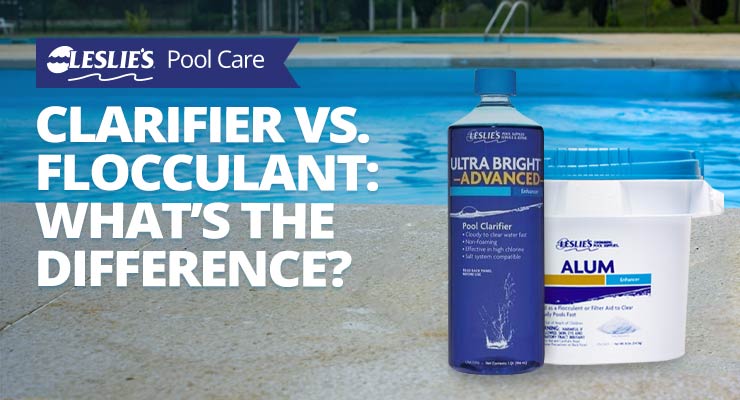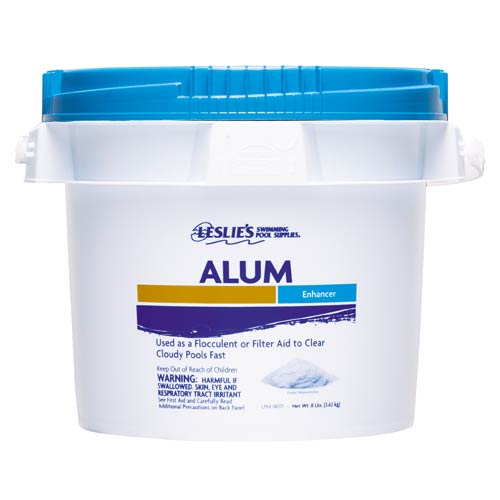
Pool Clarifier vs. Flocculant: What's the Difference?
There’s nothing more frustrating than seeing cloudy or debris-filled water in your swimming pool. Cloudy pool water is often the result of improper chemical balance and/or fine debris that happens to fall in. Very fine particles may pass right through the filter, which makes them especially difficult to remove. Enter, coagulants! That is, either a pool clarifier or flocculant. "What’s the difference?" you may be asking. Great question! Both a pool clarifier and a pool flocculant are very similar in function, but each serves a unique purpose in clearing up cloudy pool water. In this post, we'll explain what they are, what makes them different, and which one you should choose when making your pool sparkling clear again!
What is a Pool Clarifier?
Now, we don’t want to get overly complicated in explaining what a clarifier is, because it can get a bit technical. So we’ll do our best to explain this in layman's terms. A clarifier is a concentrated chemical substance that thickens the tiniest debris in your pool. This makes it easier for your pool filter to trap and remove the debris suspended in the water. Amazing, right?
Clarifiers can do this because they're made up of polymers that act as coagulants (or as some like to call them, thickening agents). They're great for targeting microscopic foreign particles that are floating in the water. I know we said we wouldn’t get too technical here, but bear with us for a second. When you pour clarifier into a pool, you add positively charged ions into the water. These positive ions act almost like tiny magnets inside your pool, attracting negatively charged debris particles. As the particles group together, this helps form large clusters that your pool filter can easily filter out. And voila! You’ve got yourself a clean, clear pool.
BONUS TIP: Follow the clarifier label directions carefully, and don’t overdose the pool. Doing so can actually cause the opposite effect, repelling particles away from each other and keeping your water cloudy. In addition, most organic clarifiers are not compatible with stain and scale control products, so don't add both chemicals to the pool on the same day.
What is a Pool Flocculant?
Now that we’ve given you the 411 on pool clarifiers, what about pool flocculants? As much as we’d like to give an extensive lesson on chemical types, pool flocculant is actually quite similar to pool clarifier in function.
Pool flocculant, also known as pool floc, also thickens tiny particles that cause cloudy pool water. Much like clarifier, flocculant uses positively charged ions to attract negatively charged debris particles together. Once those particles have coagulated (there’s that term again), these larger clumps sink to the bottom of your swimming pool. When this happens, your pool vacuum can easily suck them up.
What's the Difference Between a Clarifier and a Flocculant?
We’ve now explained the basics of both clarifiers and flocculants. And they both sound incredibly similar — almost too similar. So what sets them apart? The primary difference in a pool flocculant vs. a pool clarifier is that they perform the same job in different ways. A clarifier creates clusters of particles and keeps them suspended in the water throughout the pool. This makes it easier for the particles to get scooped up in the skimmer and main drain, then directed to the pool filter. Meanwhile, flocculant gathers the particles into larger, heavier clumps, which then sink to the bottom of your pool. This debris can then be vacuumed to waste.
Should You Use Pool Clarifier or Flocculant?
Now you must be wondering which one you should use. Assuming you have all the right equipment, the answer depends on how quickly you want your pool cleared, and how involved you want to be in the process. In general, pool owners with a D.E. or cartridge filter should use clarifiers, while pool owners with a sand filter can use either a clarifier or a flocculant. Each chemical has its own set of pros and cons.

Pool clarifier takes a while to work, but your pool filter does all the heavy lifting for you. This means no extra labor on your part, aside from cleaning the filter as you normally would. Clarifier is great for routine water maintenance, and can help resolve mild to moderate cloudiness issues. Many pool owners use a clarifier regularly — even when the pool isn't cloudy — as a way to boost filtration efficiency and keep the water sparkling.
With a flocculant, the chemical reaction happens much more quickly. Water can be cleared in a matter of hours instead of days. However, it requires a pool vacuum and extra manual labor on your part. You'll also need a sand filter with a multiport valve "Waste" setting. This will allow you to quickly and easily remove the accumulated debris from the pool floor. Remember that you'll also need to replace the waste water as you vacuum the pool. Overfilling the pool a bit before you start vacuuming will make this process easier. Make sure you don't ever let the water level drop below the skimmer opening, or you'll risk damaging your pool pump.
Whichever product you choose, there's one end goal to this: keeping a pool clean and clear of debris. After all, on a hot summer day when all you want to do is dive right in, you don’t want to have to worry about a dirty, cloudy pool! Keep your water properly balanced and sanitized, and bring a water sample by your local Leslie's for a free AccuBlue water analysis at least once per month. We'll help you make sure your pool stays swim-ready all season long.
